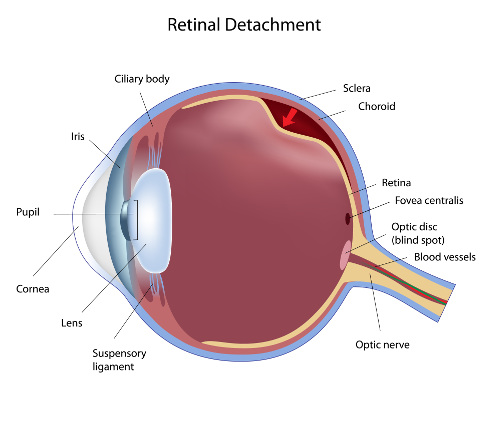4 Things to Know About Eye Floaters
-

Eye floaters are the small black or grey specks that drift aimlessly across your field of vision. Comprised of a gel-like substance called vitreous, these specks can take on a variety of shapes and sizes (they often look like cobwebs or blurred dots) and are far more noticeable when you’re staring at a blank background, such as a perfect blue sky or a bright white computer screen.
Most of the time, eye floaters are not a cause for concern. In fact, they may even go unnoticed. However, in some cases eye floaters can be indicative of a serious eye problem. The trick is knowing when.
There are four things you should know about eye floaters.
-
1. Most People Get Floaters

Eye floaters are extremely common. In fact, most people will be affected by floaters as they age.
Between the retina and lens towards the back of the inner eyeball is a gel-like substance called the vitreous body. As we age, the gel begins to dissolve and liquefy. As this happens, tiny pieces of the vitreous can break off and float around the liquid center. These floating pieces of vitreous are the benign eye floaters we often see dancing across our field of vision.
-
2. Retinal Detachment

Eye floaters typically amount to little more than an occasional nuisance. But sometimes they can be a symptom of retinal detachment, an extremely serious vision condition that can cause permanent blindness.
If you notice a showering of floaters and/or flashes of light, this could be a sign of retinal detachment. This painless condition can occur when the vitreous body causes the retina to separate from its supportive tissue in the back of the eye. The holes or tears that result can increase the flow of vitreous into the space, further dislodging the retina and leading to detachment.
The sooner a detached retina can be treated, the better the chance of saving your vision.
-
3. Floater Risk Factors

Eye floaters occur naturally as we age, typically affecting those between the ages of 50 and 75, but there are other risk factors that can increase your chances of developing floaters at a younger age. For example, people who are very nearsighted (myopic) may experience advanced dissolving of the vitreous body, leading to eye floaters earlier in life. Diabetics also face an increased risk of eye floaters as a byproduct of diabetic retinopathy, a condition that affects the blood vessels in the retina. Inflammation affecting the interior of the eye as a result of infection or trauma can also cause eye floaters. Lastly, those who have undergone cataract surgery often experience a complication called posterior capsular opacification (PCO) which can result in floaters and potential retinal detachment.
If you are concerned about eye floaters and/or have any of these increased risk factors, speak with your eye doctor about your concerns.
-
4. Getting Rid of Floaters

Even if your eye floaters aren’t associated with a serious condition like retinal detachment, they can be annoying to the extent that you’d still like to get rid of them. There are a couple of procedures that can be performed to achieve this. One, called vitrectomy, involves removing the vitreous body from the eye and replacing it with a clear fluid; no more vitreous body, no more floaters. However, the risks associated with vitrectomy outweigh the benefits — generally, it is not recommended except in extreme cases.
Fortunately there is another option: laser vitreolysis. This relatively new laser procedure targets and vaporizes large floaters through the pupil. It is considerably safer than vitrectomy, but not everyone is a candidate.



